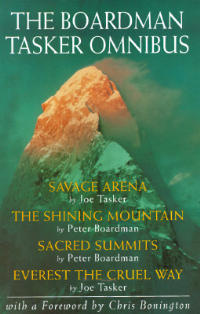La montagna di luce Due uomini sulla parete ovest del Changabang
| |||||||||||||||||
|
Editeur - Casa editrice |
Dall'Oglio | ||||||||||||||||
|
Città - Town - Ville |
Milano | ||||||||||||||||
|
Anno - Date de Parution |
1980 | ||||||||||||||||
|
Pagine - Pages | 251 | ||||||||||||||||
|
Titolo originale | The Shining Mountain | ||||||||||||||||
|
Lingua originale | |||||||||||||||||
|
Lingua - language - langue | italiano | ||||||||||||||||
|
Edizione - Collana |
Exploits | ||||||||||||||||
|
Ristampa - Réédition - Reprint |
2001 Corbaccio Exploits | ||||||||||||||||
|
Traduttore |
Alessandro Gogna | ||||||||||||||||
|
Prefazione |
Alessandro Gogna | ||||||||||||||||
|
|
|||||||||||||||||

|
Amazon.com (United States) - order this book The Boardman Tasker Omnibus: Savage Arena, the Shining Mountain, Sacred Summits, Everest the Cruel Way |
||||||||||||||||
|
|
|
Questo libro è il resoconto di un'impresa alpinistica: la conquista della parete ovest del Changabang, la più impegnativa parete di granito dell'Himalaya del Garhwal, in una spedizione leggera a due. Ma è anche la storia di come salire una montagna possa diventare lo scopo che tutto trascende, al di là di ogni considerazione su una probabile sconfitta. Ed è la storia della tensione e del reciproco isolamento che si creano in quaranta giorni di convivenza a due fino al momento della grande gioia per il successo di quella che Chris Bonington definì 'l'impresa più difficile compiuta in Himalaya'.
Recensione in altra lingua (English): |
| Peter Boardman, (now dead from a subsequent mountaineering accident), in this book relates his successful 1976 two-man climb with Joe Tasker up the west wall of Changabang in the Garhwal Himalaya. The hardships of an Alpine-type assualt on this monster mountain are related, as are the doubts and fears he experiences, along with the disciplined mental state he cultivates to banish them. | |||||||||||||
| Recensione in lingua italiana | |||||||||||||||||
|
Nota biografica: DOpo aver arrampicato sulle Alpi, nell'Hindu Kush, in Alaska e nel Caucaso, Peter Broadman (1950-1982) è stato uno degli alpinisti che ha raggiunto la vetta dell'Everest lungo la parete Sud-ovest nel 1975. Nel 1979, insieme a Tasker e Scott, raggiunge la vetta del Kanchenjunga, mentre con Hillary Couloir, che è poi diventata sua moglie, ha scalato il Kilimanjaro e il Monte Kenya. Muore con Tasker nel 1982, durante il tentativo di raggiungere la vetta dell'Everest lungo la parete Nord-est, ancora inesplorata. Il suo corpo è stato ritrovato solo 10 anni dopo. Di Peter Boardman sono apparsi in Italia La Montagna di Luce e Montagne Sacre. | |||||||||||||||||
| Biografia | |||||||||||||||||
|
Dopo aver arrampicato sulle Alpi, nell'Hindu Kush, in Alaska e nel Caucaso, Peter Broadman (1950-1982) è stato uno degli alpinisti che ha raggiunto la vetta dell'Everest lungo la parete Sud-ovest nel 1975. Nel 1979, insieme a Tasker e Scott, raggiunge la vetta del Kanchenjunga, mentre con Hillary Couloir, che è poi diventata sua moglie, ha scalato il Kilimanjaro e il Monte Kenya. Muore con Tasker nel 1982, durante il tentativo di raggiungere la vetta dell'Everest lungo la parete Nord-est, ancora inesplorata. Il suo corpo è stato ritrovato solo 10 anni dopo. Di Peter Boardman sono apparsi in Italia La Montagna di Luce e Montagne Sacre. | |||||||||||||||||
| Consulta anche: The Boardman Tasker Charitable Trust | |||||||||||||||||
| |||||||||||||||||




 La montagna di luce
La montagna di luce
